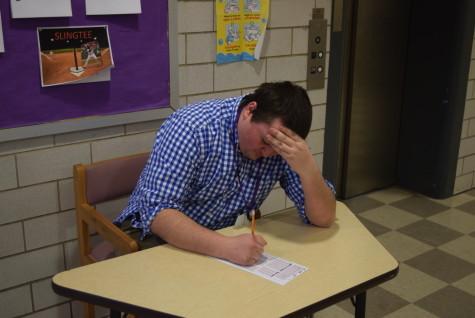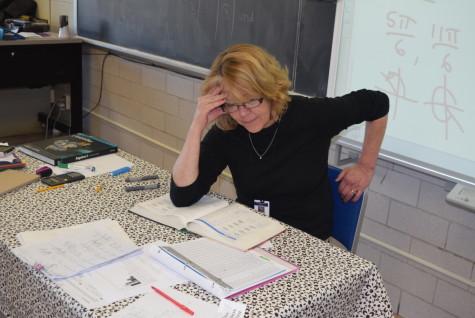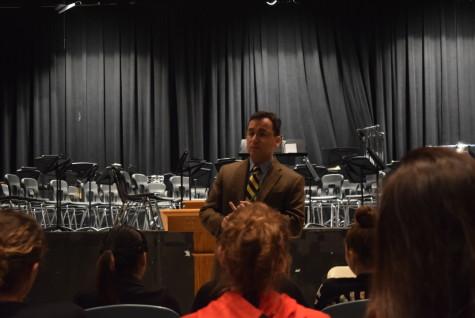Are Schools Just Numbers on Excel Sheets?
The following is one student’s perspective on a current topic in education. Agree? Disagree? We’d love to hear from you! E-mail the The Herald your thoughts to be printed in “Letters to the Editor.”

Over the last few years, many schools, including Holyoke High School, have started to focus greatly on the use of quantifiable data of its teachers and their students. In order to have this data, the Department of Elementary and Secondary Education (DESE) has mandated schools take many tests a year. Teachers now administer many tests throughout the year that they are asked to send to DESE for state officials to examine. These test scores impact teachers’ job evaluations, students’ futures, and even the fate of entire schools. Many teachers and students disagree on using this one method only as the way to measure how well schools and teachers do their job. So is there any logic to these tests?
These tests (here at Holyoke High referred to as “benchmarks”) are given in almost every class. In many cases, teachers give one test at the beginning of the year, when students don’t know the material, and then give the same test at the end of the year, after the students have seen the material, just to show state officials they have taught their students and progress has been made. Unfortunately, there are times when these tests sometimes don’t even directly relate to the subject being taught. For example, in Latin students were asked to take a test on English conventions. Yes, that is correct. An English test in Latin. How in the world can the Latin teacher be held responsible for students not being able to comprehend English?
Many teachers oppose these tests for a variety of reasons, but it can’t be denied that these scores may affect their jobs. Teachers are now taking time out of their already cramped teaching schedule to add in time to review and prepare for these tests. Likewise students, many of them already having cramped workloads, will simply brush the test aside as it has no impact on their grade, thus offsetting the scores more. Some students will also refuse to take their test and will simply sit there and do nothing or goof off. How can an entire school be judged as “effective” or “ineffective” based on some students simply choosing not to participate?
Judging a teacher’s job on the test scores of their students is simply unfair. Some teachers only have honors and AP classes thus making their overall scores higher than the teacher who maybe only has one honors class and the rest at a standard level. The same can be said for teachers who teach students whose first language is not English – they could be doing an amazing job but their students are almost guaranteed not to do as well as students whose first language is English. These things are not taken into account and will greatly impact the grades that represent the teachers. In a way, the state is discouraging teachers from working with the students who need help the most because the teachers who teach the neediest students are penalized, and get no reward for taking on such a big task.
Is this truly an effective way to measure students, teachers, and schools? Most likely not, as scores can be botched due to students, teachers, and timing. These tests are also not the best way to evaluate a school and its teachers. The fairest way to evaluate schools would be to go in and see what goes on in the classes. Use a human approach and see for yourself how well the teachers teach, how well the students respond to the teacher, how students behave in class and if they do their work. There are clearly better ways to judge a school than to look at a sheet of paper with numbers that reduces people to numbers.
By making kids take these standardized tests many people are losing creativity and are just falling in line as another statistic. Now students are viewed as, Junior #407 at Holyoke High School does well on standardized tests compared to Junior #643. Student creativity is greatly taken away by forcing kids to follow in line and not deviate from what the officials want. Students are now losing the chance to blossom and find their niche. The students should choose what fits them, as high school is the first stepping stone on their away to a productive member of society.
Three Holyoke High School teachers were kind enough to give The Herald their opinions on the subject of data. Mr. Meyer, an American history teacher, described the tests as, “a singular way to judge student abilities, and does not allow for differential assessment.” Teachers don’t even have the option to administer non multiple choice tests because all DESE wants is numerical data. This is unfair; with no variance of test types, not all students are able to show their true potential, as some may want short answer questions or others may just want one topic or a few words with a directive of “tell me what you know.”

Mrs. Albrecht, former head of the math department and current Algebra I and pre-calculus honors teacher, applies her knowledge of math and accuses the state of “ignor[ing] confounding variables, there is no scientific integrity to the data. None of the data is from a SRS.” Not having any data from a SRS (simple random sample) means there could be bias, making this “objective” way to measure students not nearly as fair as they claim. “Statistics professors have proven that the data is faulty,” explains Albrecht. Using faulty and skewed data basically ruins the entire purpose behind this method of school/student/teacher measurement. A big reform is needed in terms of grading teachers on their students’ academic performance, or better yet get rid of it and take an active role in observing classes live, not through numbers.
Beyond teachers, Dr. Sergio Paez, superintendent of the Holyoke Public School system, was kind enough to give The Herald the official stance of the district. In a response to an email sent by The Herald, Paez made many valid points to counter the opposition to testing and reliance on data in schools.
“The argument of standardized testing is a good rhetorical conversation that leaves behind the very kids it’s trying to help,” wrote Dr. Paez. “And for the most part, this conversation is taking place with people that have been able to benefit from the system they are criticizing.” He goes on to point out analyzing data has revealed to the district that Hispanic, ELL, and students with disabilities are not benefiting as much from the educational system as their peers. This is valuable information needed to improve education for everyone.
Dr. Paez also points out that since the country as a whole has decided to use standardized testing as a method of measuring who graduates and who gets accepted into college, and that is the reality on which Holyoke Public Schools must operate. “Maybe part of the new thinking is how to define success in the absence of testing; how can you prove that you learned something new and relevant?” he asked. “How to tell a college that you have the skills to be accepted? How to tell an employer that you have mastered specific skills to be given a high paying job?”

As Dr. Paez demonstrates, there are very solid reasons for testing and data collection in education. By testing everyone with the same one-correct-answer, you eliminate bias when correcting the tests. No one is seen as having an easier grader or easier assignment. By putting everyone on the same playing field so to say, no one can claim that one person has an advantage over the other, and everyone has the same opportunity no matter their current situation in life.
Herald advisor and Holyoke High English teacher Mr. Courchesne can see the merit to both sides of the argument. For him, it’s less about the tests themselves and more about their purpose. “I think it depends on what the tests are used for,” he told us. “Taking a test to measure a student’s reading level is probably a necessity, but what do you do with the results? Do you use them to help inform instruction and support the student and the student’s teacher, or do you threaten to fire the teacher and close down the school?” Mr. Courchesne points out that the “get better or else” fear tactic employed by the state is the opposite of what education officials want teachers to be doing with students.

This policy of data collection has led to the current issue of Holyoke Public Schools potentially being placed into state receivership. The state has cited low test scores and a graduation rate that is lower than other districts in the state. State officials have recently visited Holyoke High and other schools in the district to evaluate the on-goings and activities of the school.
There is much controversy over this issue of receivership and groups are stepping up to defend our schools such as the group “Reclaim our Schools” led by the community. This is a grassroots organization made up of parents, teachers, students, and other community members. The Herald was on-hand for this group’s meeting and you can read about it here.
One could compare this practice of grading schools to the old adage of “don’t judge a book by its cover.” It’s hard to look to just look at piece of paper with numbers on it and say that school is “under-achieving” or that teacher is “bad”. The state needs to actually go into these schools and see what going. Are the teachers doing a good job? Are the students attentive? Does the school have a good learning environment? Changes from looking at numbers to taking an active roles in schools should be taken.












